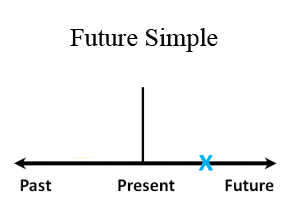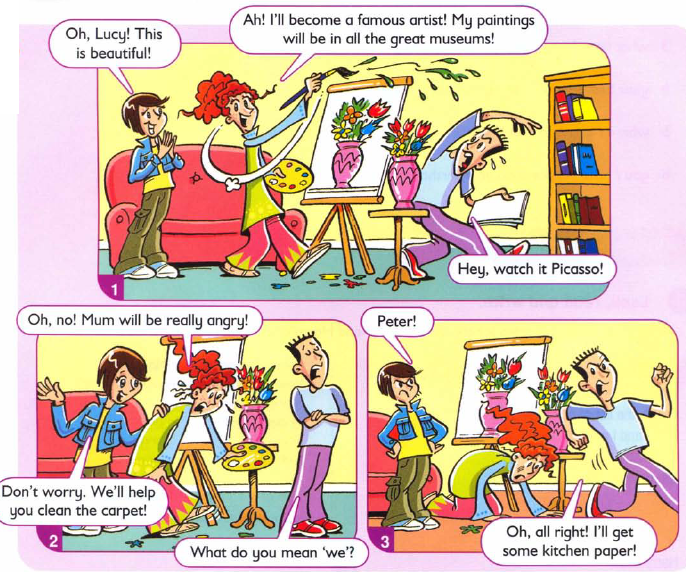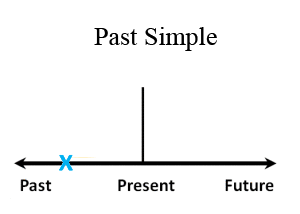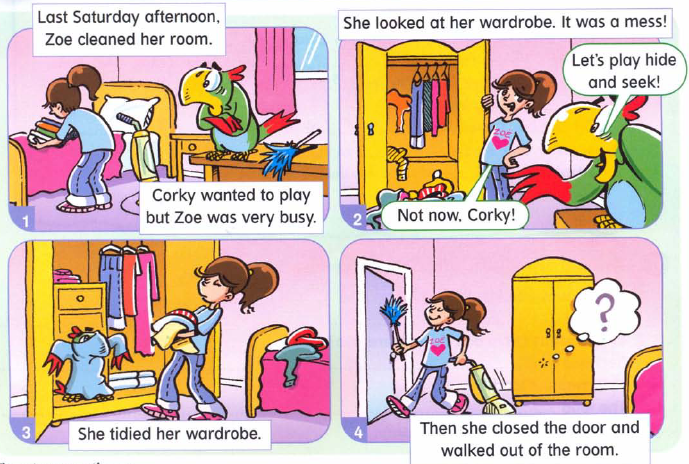
Use
• We use the present simple to talk about:
habits, things that we do regularly:
I go to school every day.
• facts, things that are always or usually true:
My parents work in a bank.
The Earth goes round the sun.
Form
• In positive sentences, we add -s or -es to the main verb in the third person singular (he/she/it).
I play the violin. She plays the violin.
• In negative sentences and questions, we do NOT add -s or -es to the main verb for he/she/it
He likes pizza. He doesn ‘t like pizza. Does he like pizza?
Time expressions
• We often use these time expressions with the present simple to say when something happens:
in January, in the winter, in the morning /afternoon/evening on Mondays,
on Monday morning, on my birthday, on the 4th of»August at seven o’clock,
at midnight, at the weekend, at night, at Christmas
• We also use these phrases to say how often something happens:
every day/week/month/year
once/twice/three times a week.
• They come at the beginning or end of the sentence.
Every day she meets her friends the park. Jon visits his aunt every week. We wash our car once a week.
• We say:
in the morning BUT on Monday morning
at Christmas BUT on Christmas day
on Mondays BUT every Monday
Употребление
1) Говорим о том что всегда верно, о том что происходит часто или всегда, т.е. нам не важно, когда оно происходит. В подобных предложениях могут употребляться любые обстоятельства времени с таким значением (usually — обычно, always — всегда, every day — каждый день, often — часто, once a month — раз в месяц, sometimes — иногда, seldom — редко, daily — ежедневно и т.д.






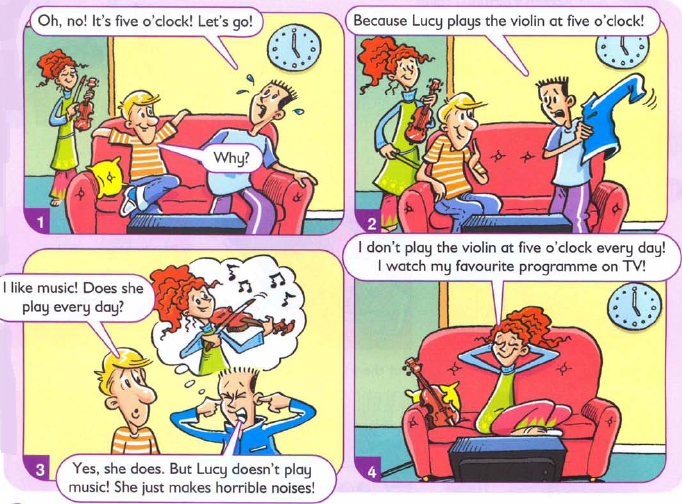
|
|
| I usually get up at 7. |
|
| I go to school every day. |
|
| She goes to the cinema on Sundays. |
|
| They usually walk in the garden. |
|
| We don’t like exams! |
|
| Does he study well? |
|
| On Mondays he goes to the gym. |
|
| You never arrive on time. |
|
| I seldom go to the zoo. |
|
| Francis occasionally drinks coffee. |
|
| Ron seldom does his homework. |
|
| They do not often sing songs. |
|
| Pierre does not play tennis every week. |
|
| I do not usually watch TV in the mornings. |
|
| Do they spend their holidays in Canada every year? |
|
| Does he always wear a hat? |
|
2)Рассказываем о явлениях природы , истинах, тех фактах, которые нельзя изменить.
| Paris is the capital of France. |
|
| Hamlet is a play by Shakespeare. |
|
| Mount Everest reaches a height of 8848 metres. |
|
| Water boils at 100°C. |
|
| Ice melts at 0°C. |
|
| The river Thames flows past the Houses of Parliament. |
|
| The Olympic Games take place every four years. |
|
| A waiter works in a restaurant. |
|
| The earth travels around the sun in approximately 365 days. |
|
| My father speaks English. |
|
| The sun sets in the west. |
|
| The Muslims do not eat pork. |
|
| My father never wears a tie. |
|
3)Говорим о расписаниях и для выражения будущего действия с глаголами
движения (go, arrive, come, leave).
| The train arrives at 8:00 p.m. |
|
| The lesson starts at four. |
|
| The plane arrives in London at 11:45. |
|
| The lesson starts in five minutes. |
|
| The film begins at 8 o’clock. |
|
| My brother’s birthday is on Wednesday. |
|
| The train leaves Manchester at 7:23. |
|
| The festival ends on Sunday. |
|
| The next bus comes in 35 minutes. |
|
| Which day does the exhibition open? |
|
| What day is it tomorrow? |
|
| What time does the zoo close? |
|
| My father goes to London next week. |
|
| The train leaves at 10°°. |
|
4)Действия происходят одно за другим.
| Janine gets up at seven o’clock. |
|
| She has breakfast and then she goes into the bathroom. |
|
| She takes a cold shower, brushes her teeth and combs her hair. |
|
| After that she puts on her clothes. |
|
| Then Janine leaves the house and locks the door. |
|
| She goes to the bus stop and waits for the bus. |
|
| When the bus arrives, she gets on the bus and goes to work. |
|
5) Употребляем когда действие или умение имеет характеристику.
| My sister swims very well. |
|
| Our teacher speaks good English. |
|
| My brother eats too much sweets. |
|
6) Употребляем когда о человеке сообщаются какие-либо сведения.
| Tom lives in London. |
|
| Не works in a restaurant and collects butterflies. |
|
| Ann studies at Harvard. |
|
7) Употребляем когда выражается мнение, отношение.
| I love you! |
|
| I hate cold. |
|
| I don`t like jazz. |
|
8) Сообщаем объективные или общеизвестные факты.
| There are about 300 children in the school. |
|
| It`s hot today. |
|
9) Употребляем в пословицах и поговорках, когда рассказывают анекдоты, шутки, в спортивном комментарии — для передачи быстрых действий, для сообщения научных фактов, в заголовках газет для передачи событий в прошлом.
Some verbs are used only in simple tenses.
For example, you cannot say ‘I am knowing’.
You can only say I know.
Here is a list of verbs which are not normally used in continuous tenses (but there are exceptions):
want, like, belong, know, suppose, remember
need, love, see, realise, mean, forget
prefer, hate, hear, believe, understand, seem
have (when the meaning is ‘possess’ — see also Unit 24) think (when the meaning is ‘believe’)
— Do you like London? (not ‘are you liking’)
— He doesn’t understand, (not ‘he isn’t understanding’)
— These shoes belong to me. (not ‘are belonging’)
— What do you think Tom will do? (= What do you believe he will do?)
but: What are you thinking about? (= What is going on in your mind?)
Дополнительные примеры:
| You listen to the radio. |
|
| It rains a lot. |
|
| I want a car. |
|
| She watches the match. |
|
| You see the house. |
|
| We arrive at the airport. |
|
| We follow the leader. |
|
| I get up early. |
|
| She writes poems. |
|
| They swim in the lake. |
|
| I answer the question. |
|
| You ask a question. |
|
| You carry a box. |
|
| Fiona visits her grandma. |
|
| I want a car. |
|
| They have a hamster. |
|
| They hear a sound. |
|
| He makes a mistake. |
|
| You understand the sentence. |
|
| He wears a blue shirt. |
|
| I answer the question. |
|
| You ask a question. |
|
| You play cards. |
|
| It rains a lot. |
|
| Christine decorates her home. |
|
| We sail on the lake. |
|
| I get up early. |
|
| We lose the game. |
|
| Eric forgets his homework. |
|
| Jamie wins all the races. |
|
| I look sad. |
|
| I buy bread. |
|
| You see the house. |
|
| The book belongs to me. |
|
| Amelie closes the door. |
|
| We change our clothes. |
|
| The car stops at the corner. |
|
| He turns around. |
|
| We drink tea. |
|
| She teaches in London. |
|
| You listen to the radio. |
|
| It rains a lot. |
|
| I am American. |
|
| He has a computer. |
|
| I buy bread. |
|
| We give her an apple. |
|
| I hate rainy weather. |
|
| I get up early. |
|
| Jamie wins all the races. |
|
| She teaches in London. |
|
| We climb a mountain. |
|
| I like cats. |
|
| We open the door. |
|
| You see the house. |
|
| The teacher checks our homework. |
|
| They shout at me. |
|
| You speak English. |
|
| She writes poems. |
|
| My sister feeds our dog. |
|
| She teaches in London. |
|
| He answers the question. |
|
| They call us. |
|
| Jenny locks the door. |
|
| I read magazines. |
|
| They run races. |
|
| We give her an apple. |
|
| I believe in ghosts. |
|
| The book belongs to me. |
|
| She draws a circle. |
|
| I know him. |
|
| The dog barks. |
|
| They collect postcards. |
|
| I look sad. |
|
| You are Australian. |
|
| They thank their mum. |
|
| They notice the mistake. |
|
| The children sleep on the floor. |
|
| I know him. |
|
| Your father drives a lorry. |
|
| He wears a blue shirt. |
|
| We live in London. |
|
| I look sad. |
|
| We stay with a family. |
|
| I buy bread. |
|
| They thank their mum. |
|
| We change our clothes. |
|
| Gareth empties the bin. |
|
| The teacher explains the tenses. |
|
| Sally hurries to school. |
|
| Cindy takes a book. |
|
| It rains a lot. |
|
| He washes the car. |
|
| His head aches. |
|
| Amelie closes the door. |
|
| Gareth empties the bin. |
|
| They shout at me. |
|
| The children sleep on the floor. |
|
| He hurts his leg. |
|
| Ben lights the fire. |
|
| They stand at the corner. |
|
